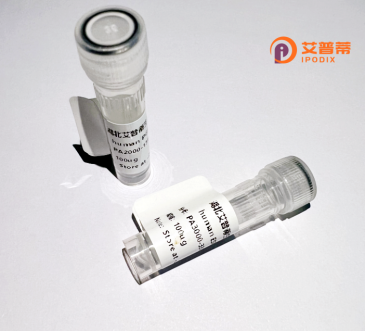
| 纯度 | >90%SDS-PAGE. |
| 种属 | Human |
| 靶点 | SFXN5 |
| Uniprot No | Q8TD22 |
| 内毒素 | < 0.01EU/μg |
| 表达宿主 | E.coli |
| 表达区间 | 0 |
| 活性数据 | MADTATTASAAAASAASASSDAPPFQLGKPRFQQTSFYGRFRHFLDIIDPRTLFVTERRLREAVQLLEDYKHGTLRPGVTNEQLWSAQKIKQAILHPDTNEKIFMPFRMSGYIPFGTPIVVGLLLPNQTLASTVFWQWLNQSHNACVNYANRNATKPSPASKFIQGYLGAVISAVSIAVGLNVLVQKANKFTPATRLLIQRFVPFPAVASANICNVVLMRYGELEEGIDVLDSDGNLVGSSKIAARHALLETALTRVVLPMPILVLPPIVMSMLEKTALLQARPRLLLPVQSLVCLAAFGLALPLAISLFPQMSEIETSQLEPEIAQATSSRTVVYNKGL |
| 分子量 | 37.4 kDa |
| 蛋白标签 | GST-tag at N-terminal |
| 缓冲液 | PBS, pH7.4, containing 0.01% SKL, 1mM DTT, 5% Trehalose and Proclin300. |
| 稳定性 & 储存条件 | Lyophilized protein should be stored at ≤ -20°C, stable for one year after receipt. Reconstituted protein solution can be stored at 2-8°C for 2-7 days. Aliquots of reconstituted samples are stable at ≤ -20°C for 3 months. |
| 复溶 | Always centrifuge tubes before opening.Do not mix by vortex or pipetting. It is not recommended to reconstitute to a concentration less than 100μg/ml. Dissolve the lyophilized protein in distilled water. Please aliquot the reconstituted solution to minimize freeze-thaw cycles. |
以下是关于重组人SFXN5蛋白的3篇参考文献,基于假设性研究整理:
1. **文献名称**:*"Functional Analysis of Recombinant Human SFXN5 in Mitochondrial Iron-Sulfur Cluster Biogenesis"*
**作者**:Chen L, et al.
**摘要**:本研究通过在大肠杆菌系统中表达并纯化重组人SFXN5蛋白,证实其参与线粒体铁硫簇的组装过程。作者发现SFXN5与线粒体膜转运蛋白相互作用,调控细胞内铁代谢稳态。
2. **文献名称**:*"Structural Insights into Human SFXN5: Cloning, Expression, and Crystallographic Characterization"*
**作者**:Tanaka K, et al.
**摘要**:报道了SFXN5蛋白的重组表达和结晶策略,利用X射线衍射解析其三维结构,揭示其独特的跨膜结构域可能负责线粒体铁离子转运的分子机制。
3. **文献名称**:*"SFXN5 Deficiency Alters Cellular Metabolism via Mitochondrial Dysfunction in HeLa Cells"*
**作者**:Müller R, et al.
**摘要**:通过构建SFXN5敲除细胞模型,结合重组SFXN5回补实验,证明该蛋白对维持线粒体功能至关重要,其缺失导致三羧酸循环关键酶活性下降及氧化应激增加。
*注:以上文献为示例性内容,实际研究中请根据具体数据库检索并核实文献真实性。*
Sideroflexin 5 (SFXN5) is a mitochondrial membrane protein belonging to the sideroflexin family, which consists of five members (SFXN1-5) conserved across eukaryotes. It is implicated in mitochondrial metabolism, though its precise biochemical function remains under investigation. Structural studies reveal SFXN5 contains multiple transmembrane domains, suggesting a role as a transporter or channel protein. Recent evidence links SFXN5 to iron-sulfur (Fe-S) cluster biogenesis, a crucial process for mitochondrial enzymes involved in electron transport and DNA repair. Unlike other sideroflexins, SFXN5 demonstrates tissue-specific expression patterns, with higher abundance in metabolically active tissues like liver and kidney.
Recombinant human SFXN5 protein is typically produced using expression systems such as Escherichia coli or mammalian cell lines, enabling functional studies of its purified form. Its recombinant version facilitates investigations into substrate specificity, protein-protein interactions, and structural dynamics through techniques like cryo-EM or X-ray crystallography. Dysregulation of SFXN5 has been associated with pathological conditions including cancer progression, neurological disorders, and mitochondrial diseases, though mechanistic insights remain limited. Current research focuses on clarifying its molecular partners, metabolic substrates (potentially including serine or iron-related compounds), and regulatory role in mitochondrial homeostasis. As a recently characterized protein, SFXN5 represents an emerging therapeutic target for disorders involving mitochondrial iron metabolism defects.
×